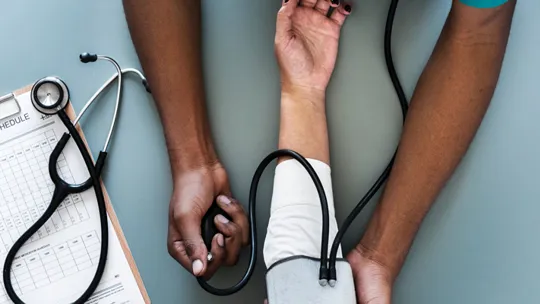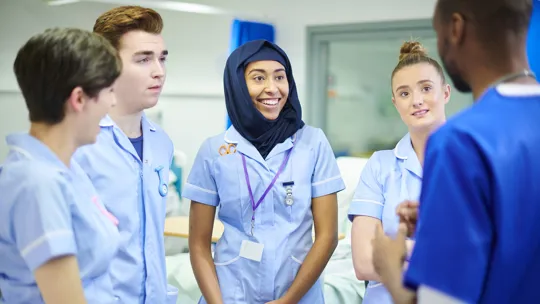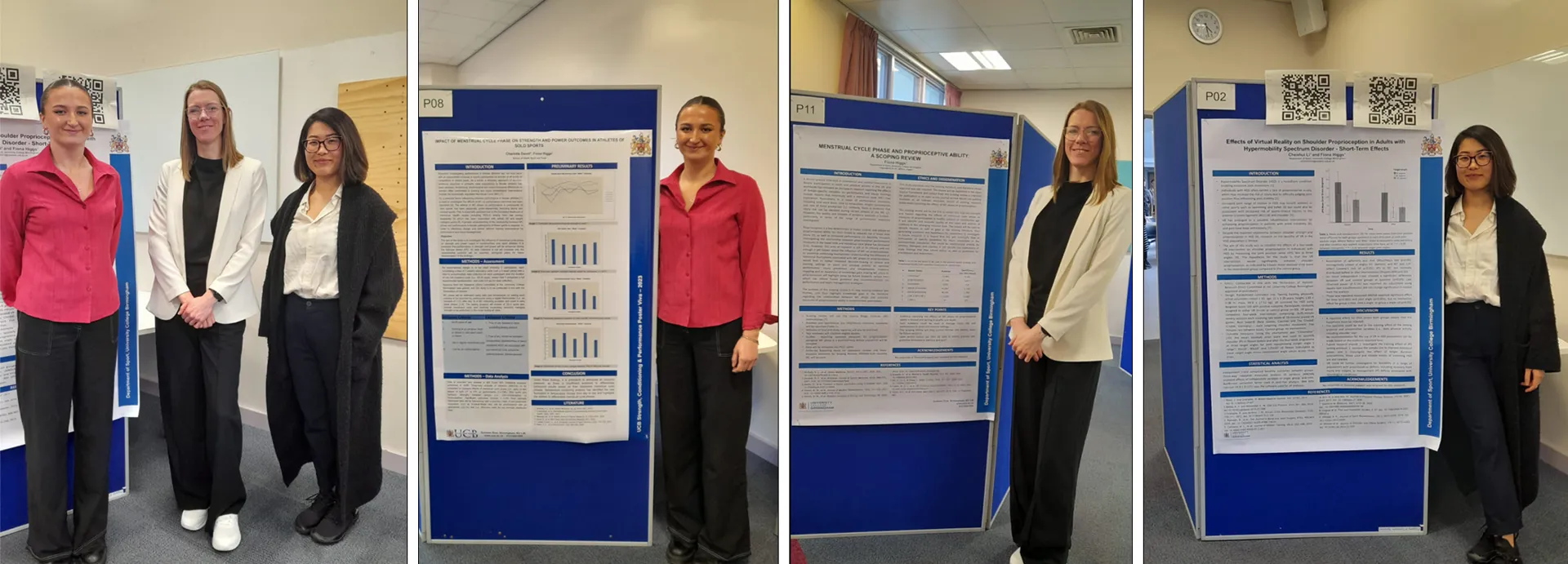April 2024
Sports Therapy students and staff put best foot forward with research at conference
By Carrie Mok
Share post:Read time: approx 4 mins
Two final year Sports Therapy students and a lecturer presented their dissertation research projects at the British Association of Sport and Exercise Science (BASES) Biomechanics and Motor Behaviour Division annual conference, sharing knowledge with fellow researchers.
Students Charlotte Daunt and Eve Li exhibited their projects at the conference at Loughborough University and discussed their work with other researchers.
Charlotte’s project, ‘The impact of menstrual cycle phase on strength and power outcomes on athletes of solo sports’, investigates an under-researched area of women’s health within sport.
Once completed it will provide further evidence into the understanding of how the menstrual cycle affects women athletes and allow collaboration with coaches and health care professionals in sport. The research will also enable training demands to be tailored, improving injury and performance management.
"Attending the BASES conference was a very insightful day into current research being conducted. It was a great achievement for me to have my work viewed by fellow researchers within the field and have constructive discussions about my project."
Meanwhile, Eve presented ‘Effects of virtual reality on shoulder proprioception in adults with hypermobility spectrum disorders (HSDs)-Short term effect’. Eve used joint position sense tests on individuals with HSDs playing virtual reality (VR) games over 4 weeks to understand how VR could influence proprioceptive acuity and contribute to maintaining functional stability in the shoulder joint. Proprioception is the ability to sense body position/orientation in relation to our surroundings.
Eve’s findings suggest that VR holds potential for enhancing proprioceptive accuracy and could be incorporated into rehabilitation programmes for individuals with proprioceptive deficits, such as those related to shoulder instability and recurrent shoulder dislocations.
"I had the privilege of presenting my undergraduate research at a distinguished biomechanics event, alongside numerous other highly valued projects. It was an incredible and eye-opening experience that covered the latest topics in the field and stimulated thought on future research directions. I highly recommend this event to future students for its invaluable insights."
The conference promotes the networking and CPD of sport and exercise scientists, showcasing areas of research within their disciplines.
Fiona Higgs, Sports Therapy Lecturer, also presented her research into the effects of hormonal fluctuations through the menstrual cycle on proprioception.
“Proprioception is critical for ensuring that we can move safely and effectively around our environment without sustaining an injury. Changes in hormones throughout the menstrual cycle are known to influence a number of performance and injury-related factors, but unfortunately not much is known about it's effect on proprioception. I hope that by addressing these gaps in the research literature there will be more evidence produced to inform clinical and performance strategies used to manage performance and injury in female populations.
"Events like this play a key role in the transference of scientific research into practice for performance and injury management in sport. It was thoroughly rewarding to see our hardworking and talented undergraduate students share their applied research projects with professionals from both academia and industry in a world-class conference. Hopefully it is a memory they will look back on proudly as they progress in their careers for many years to come."
The BASES conference promotes the networking and CPD of sport and exercise scientists, showcasing areas of research within their disciplines.
Find out more about the courses and facilities available at University College Birmingham’s Department of Sport, including a state-of-the-art human performance centre and the opportunities available to students.
Check out our latest news stories

Chelmsley Wood culinary school makes its mark
Chelmsley Wood culinary school hoardings revealed.
Read more
MP visit champions collaboration as key to changing outcomes for young people
Sarah Smith MP visit champions collaboration as key to improving outcomes for young people.
Read more
Blog | The 9 things we wish we knew before starting university
From staying organised to looking after our wellbeing, there’s a lot we wish we’d thought about before starting our degrees, so…
Read more
HIRED successfully retains Matrix accreditation
Retaining the gold standard in accreditation for its advice and guidance reaffirms the quality of support offered to students.
Read more
Blog | How to pursue a career in healthcare without a degree
Did you know you don’t always need a degree to work in healthcare?
Read more
Blog | Nursing Associate vs Registered Nurse: choosing the right path for you
Not sure which nursing course is for you? This blog will help you to find out which role fits your goals, lifesty…
Read more